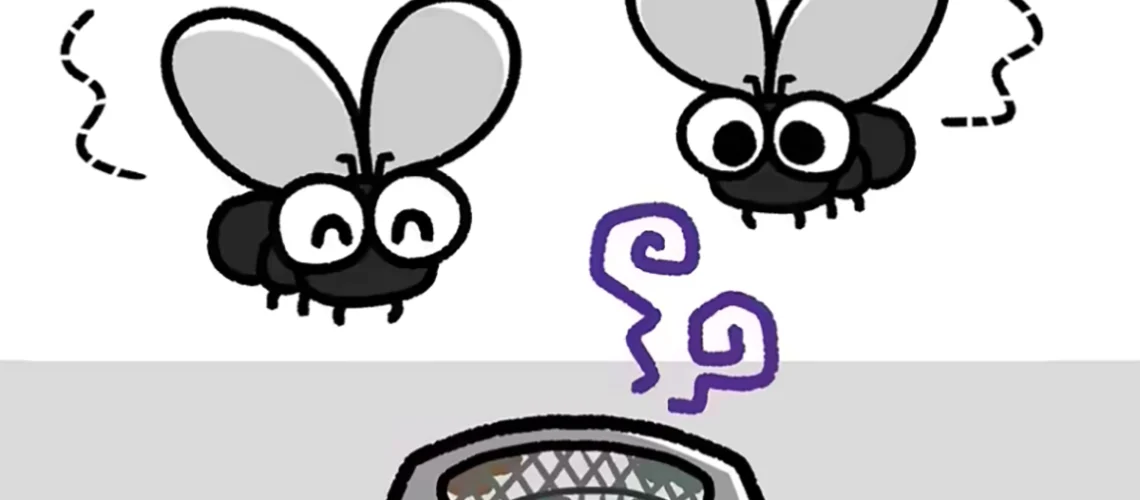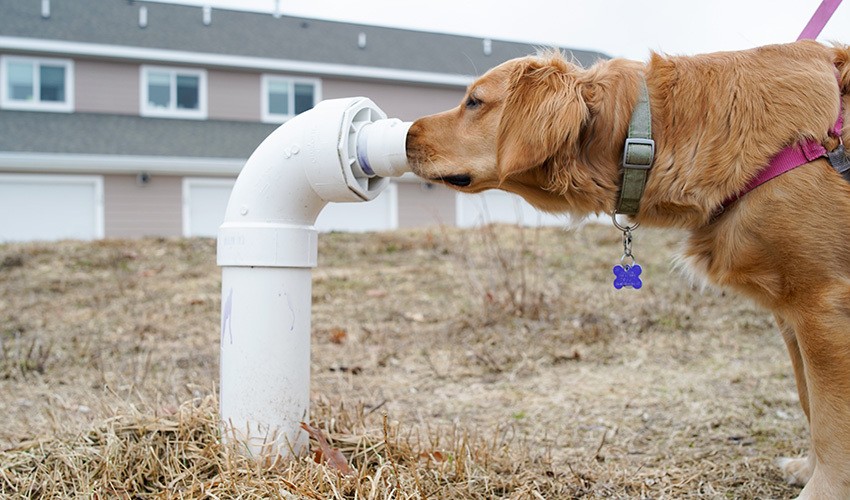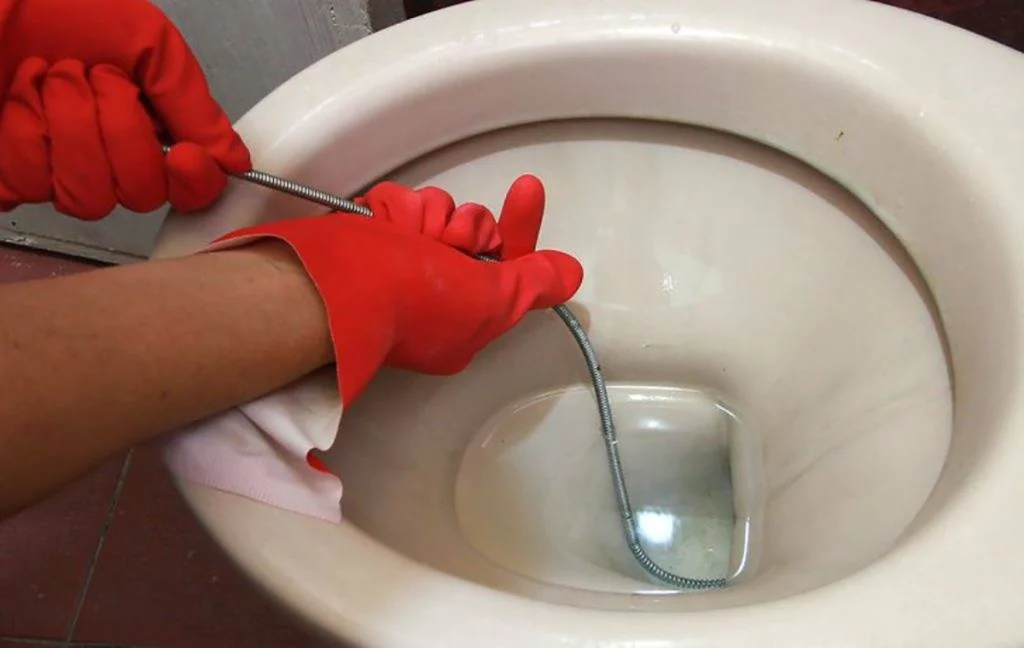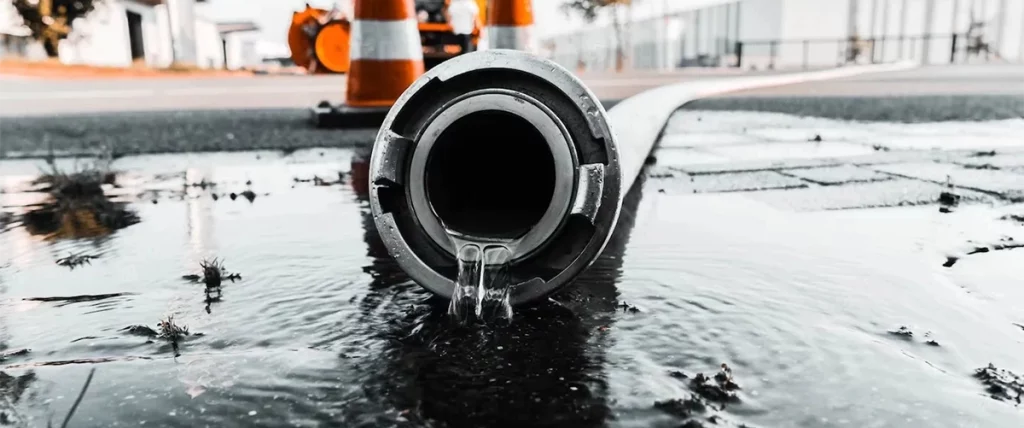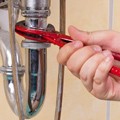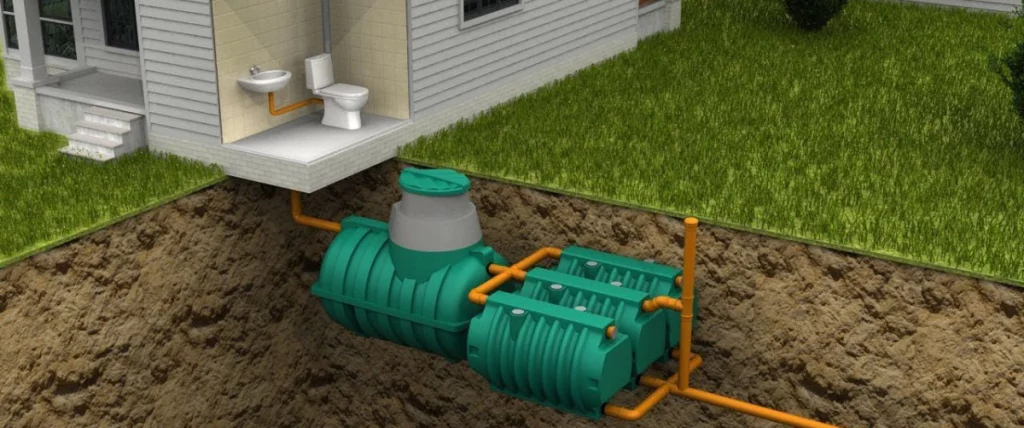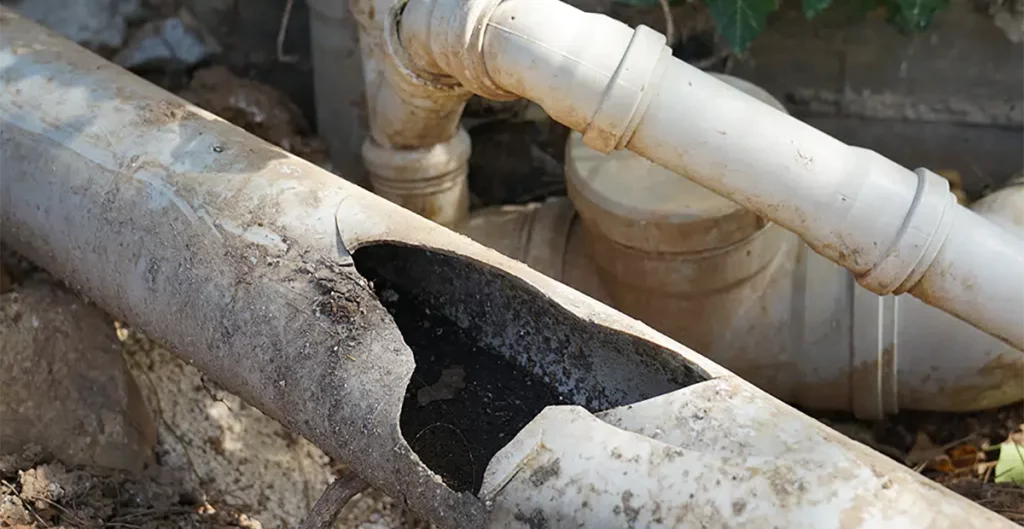Drain flies, also known as sewer flies or moth flies, are tiny, nuisance pests that can infest your home. They are often found near drains and can be a source of frustration. Fortunately, there are steps you can take to control and eliminate drain fly infestations. In this guide, we’ll explore various methods for managing these pesky insects.
Contents
- 1 Signs of a Drain Fly Infestation
- 2 Why Drain Flies Thrive in Your Home
- 3 DIY Drain Fly Removal Methods
- 4 Maintaining Clean Drains
- 5 Regular Drain Flies Removal and Prevention
- 6 Hiring Professional Exterminators for Drain Flies Removal
- 7 When to Seek Professional Help
- 8 When DIY Isn’t Enough
- 9 Drain Flies Prevention – What to Do Regularly
- 10 Conclusion: Stay Ahead of Drain Fly Infestations
- 11 FAQ about How To Control Drain Flies In Your Home
Signs of a Drain Fly Infestation
Before initiating any drain flies removal, it’s important to recognize the typical signs:
- Small, fuzzy-winged flies hovering near drains or garbage disposals
- Larvae (tiny worm-like insects) in drain openings
- A musty, unpleasant odor around sink areas
Early identification makes drain flies removal DIY much easier and more effective.
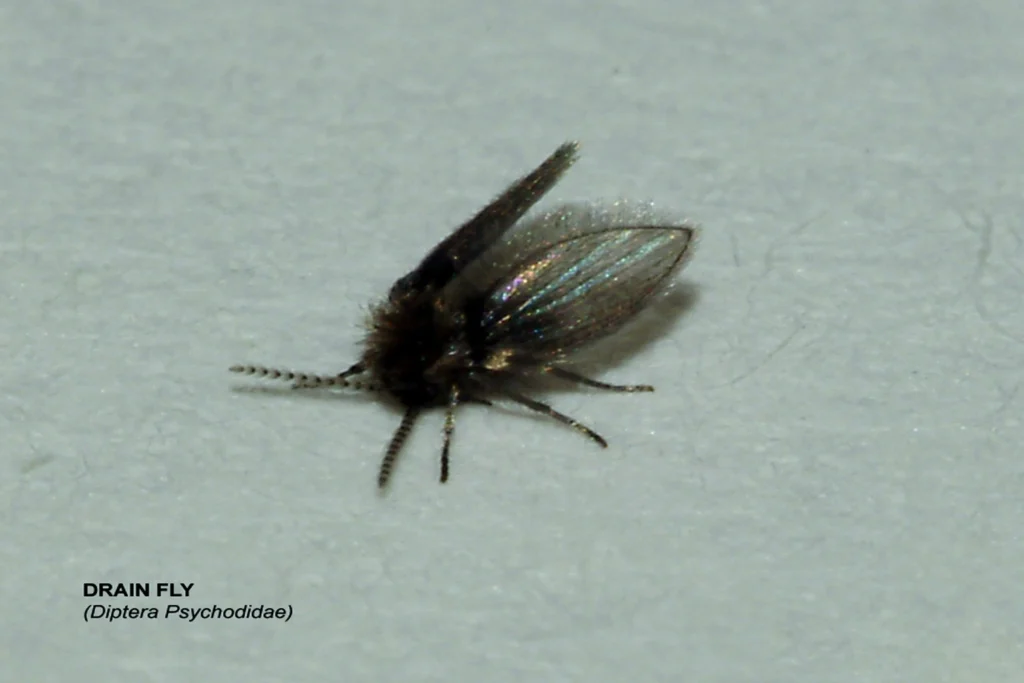
Why Drain Flies Thrive in Your Home
Drain flies thrive in moist, organic environments. The slimy film that builds up inside drainpipes is an ideal breeding ground for these pests. Any clogged or slow-draining sink or shower creates a perfect habitat.
Say Goodbye to Drain Flies for Good
Tired of drain flies buzzing around your sink?
Our team offers fast and effective drain flies removal—whether you prefer DIY advice or need professional support.
🛠️ Contact POM Plumbing today for expert help and lasting results.
DIY Drain Fly Removal Methods
You can start drain fly removal at home with these proven DIY drain fly removal techniques:
1. Clean the Drains Thoroughly
Remove debris, food waste, and biofilm from the inner surfaces of your pipes using a drain brush or enzyme-based cleaner.
2. Use Boiling Water
Pour boiling water down infested drains daily for several days. This kills larvae and loosens organic matter clinging to pipe walls.
3. Baking Soda and Vinegar Treatment
Pour ½ cup of baking soda followed by ½ cup of vinegar into the drain. Cover the drain and let it fizz. After 20 minutes, flush with hot water.
4. Install Drain Covers
Prevent further breeding by sealing off open drains. This keeps adult flies from laying more eggs.
5. Eliminate Standing Water
Fix leaking faucets and empty unused sinks or tubs. Stagnant water is one of the main causes of repeated infestations.
These drain flies removal DIY steps are usually sufficient for mild to moderate infestations.
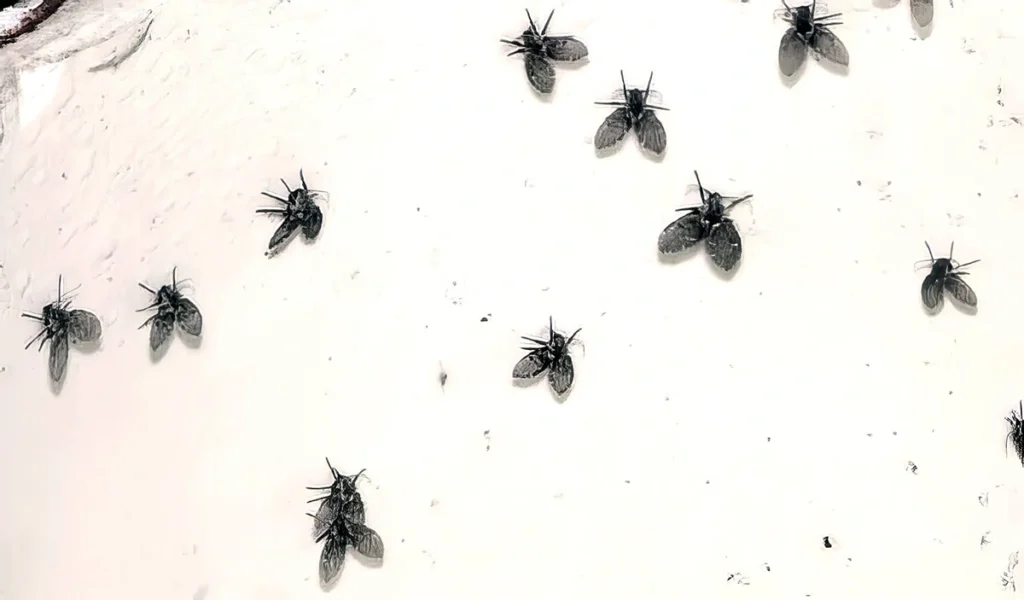
Maintaining Clean Drains
Prevent future infestations by maintaining a regular drain cleaning routine:
- Avoid pouring grease or food scraps down the sink.
- Use drain strainers to catch hair and debris.
- Flush drains weekly with hot water or a mild natural cleaner.
Preventative care is key to long-term drain fly removal success.
Regular Drain Flies Removal and Prevention
Even after successful DIY control, drain flies can return. To prevent this:
- Maintain a regular cleaning schedule for your drains.
- Inspect and repair any leaks in plumbing fixtures.
- Ensure proper ventilation in bathrooms to reduce moisture.
- Eliminate standing water in and around your home.
Hiring Professional Exterminators for Drain Flies Removal
When DIY methods prove ineffective, it may be time to consult professional exterminators. They have the expertise and tools to address severe infestations and can provide long-lasting solutions.
DIY Not Working? We’ve Got Your Back
Tried DIY drain fly removal but the pests keep coming back?
Don’t let a minor problem turn into a major headache. Get professional drain fly removal that solves the issue at its source.
📞 Schedule your inspection now with POM Plumbing!
When to Seek Professional Help
Knowing when to seek professional help for a drain fly infestation is crucial, especially if your DIY efforts prove ineffective or if the infestation is severe. Here are some situations that indicate it’s time to consult a professional:
- Persistent Infestation: If drain flies continue to be a problem despite your DIY control efforts, it’s a sign that there may be underlying issues that require professional attention.
- Hidden Plumbing Problems: If you suspect that hidden plumbing issues, such as damaged pipes or sewer line problems, are contributing to the drain fly infestation, a professional plumber should be called in to assess and address these issues.
- Multiple Areas Affected: If drain flies are infesting multiple areas of your home, it may indicate a more extensive problem that requires expert diagnosis and treatment.
- Health Concerns: If you or your family members are experiencing health issues related to the drain fly infestation, such as allergies or respiratory problems, it’s essential to seek professional help to eliminate the problem and address any health risks.
- Severe Infestation: In cases of severe infestations where drain flies are numerous and persistent, professional exterminators have the expertise and tools to address the problem effectively.
- Hidden Breeding Sites: Drain flies can breed in hidden or hard-to-reach areas within your plumbing system. A professional can identify and eliminate these breeding sites.
- Complex Pest Control: If you’re dealing with other pest infestations alongside drain flies, such as roaches or rodents, it’s best to consult a professional pest control company that can handle multiple pest issues simultaneously.
- Commercial or Multi-Unit Properties: For businesses or multi-unit residential properties with drain fly infestations, professional pest control services may be necessary to ensure the problem is resolved comprehensively.
- Persistent Odor: If the drain fly infestation has led to an unpleasant, musty odor in your home, it may indicate a more extensive problem that requires professional intervention.
- Ineffectiveness of DIY Solutions: If your DIY drain fly control methods have not yielded positive results within a reasonable timeframe, it’s a clear indication that professional help is needed.
When seeking professional assistance for drain fly control, consider hiring an experienced exterminator or pest control company with a proven track record in handling drain fly infestations. Additionally, for plumbing-related issues, such as hidden pipe damage or sewer line problems, consult a licensed and reputable plumber to diagnose and address the underlying plumbing concerns.
By recognizing the signs that necessitate professional help and taking prompt action, you can effectively resolve drain fly infestations and ensure a pest-free and sanitary living environment.
In conclusion, controlling drain flies requires a combination of DIY methods, regular maintenance, and proper hygiene practices. By taking proactive steps and seeking professional help when needed, you can effectively manage and eliminate drain fly infestations in your home, creating a more sanitary and comfortable living environment.
When DIY Isn’t Enough
While DIY drain fly removal is often effective, some infestations require expert intervention. Contact a professional if:
- Flies return despite cleaning efforts
- You notice multiple breeding sites
- There are signs of hidden plumbing damage
Professional drain flies removal specialists and licensed plumbers can identify deeper problems and offer lasting solutions.
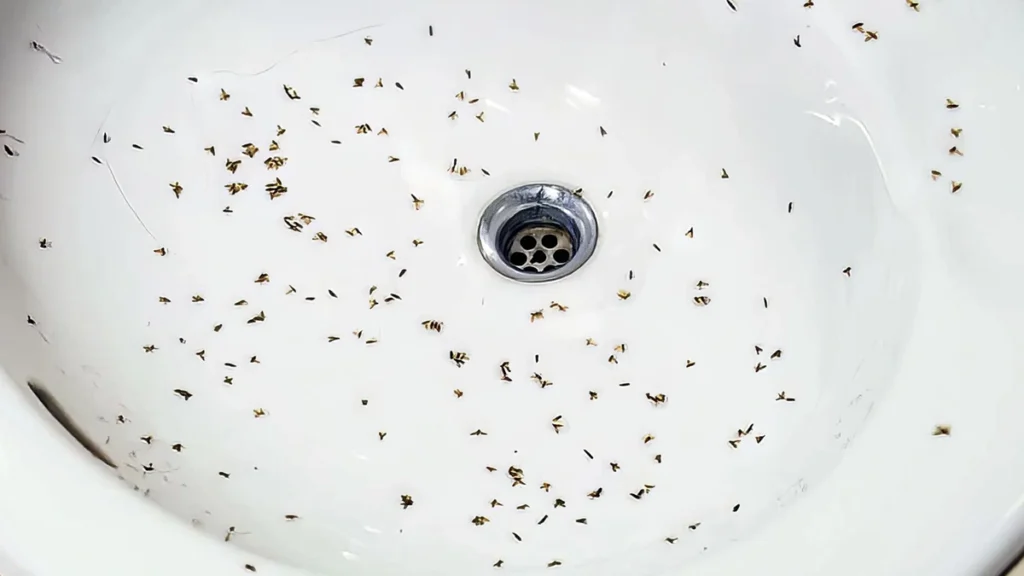
Drain Flies Prevention – What to Do Regularly
Preventing drain flies is much easier than dealing with an active infestation. Simple maintenance habits can stop these insects from finding the damp, organic buildup they need to breed. Follow these practical drain flies prevention steps to keep your home free of pests year-round:
- Inspect drains that aren’t used often — such as in basements or guest bathrooms — and run hot water through them weekly to flush out stagnant moisture.
- Avoid pouring grease, oil, or food residue into kitchen sinks; these materials attract and feed drain fly larvae.
- Install fine mesh drain covers or strainers to block adult flies from entering and laying eggs.
- Keep bathrooms and laundry rooms well-ventilated. Use an exhaust fan or dehumidifier to minimize humidity and condensation.
- Check plumbing traps and joints regularly for leaks or damp spots and fix them promptly to remove breeding areas.
- Use an enzyme-based or bacterial drain cleaner once a month to remove organic film that supports drain fly growth.
- If drain flies return frequently, inspect outdoor areas near AC condensate lines, foundation drains, or puddles — they can be hidden sources of moisture.
Conclusion: Stay Ahead of Drain Fly Infestations
Controlling drain flies involves a proactive mix of sanitation, regular maintenance, and targeted cleaning. Whether you’re trying drain flies removal DIY or working with a professional, the goal is to eliminate their breeding grounds and stop the cycle.
For persistent problems, don’t hesitate to reach out to experts in drain fly removal and plumbing care.
FAQ about How To Control Drain Flies In Your Home
Drain flies are attracted to moisture and organic matter. They thrive in damp environments and are often found near drains where they can feed on the organic buildup inside pipes.
You should seek professional pest control for drain flies if your DIY efforts fail, the infestation persists, or if you notice multiple areas affected. Additionally, if you suspect hidden plumbing issues or severe infestations, professional help is advisable.
Yes, drain flies can be an indication of more significant plumbing issues. They often breed in the organic matter within drain pipes, which can result from leaks, clogs, or damaged plumbing. If you have a persistent drain fly problem, it’s wise to have a professional plumber inspect your plumbing system for underlying issues.



